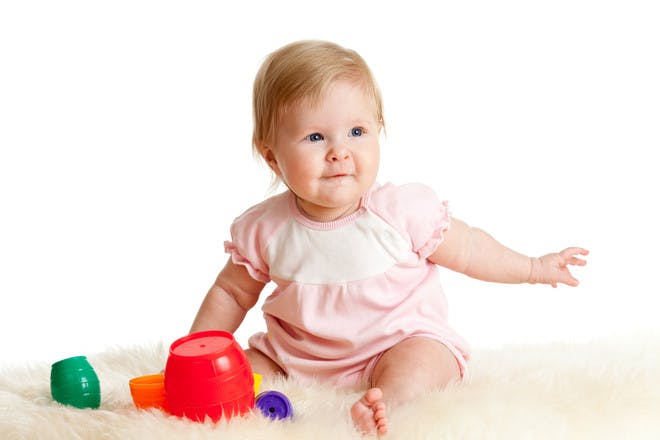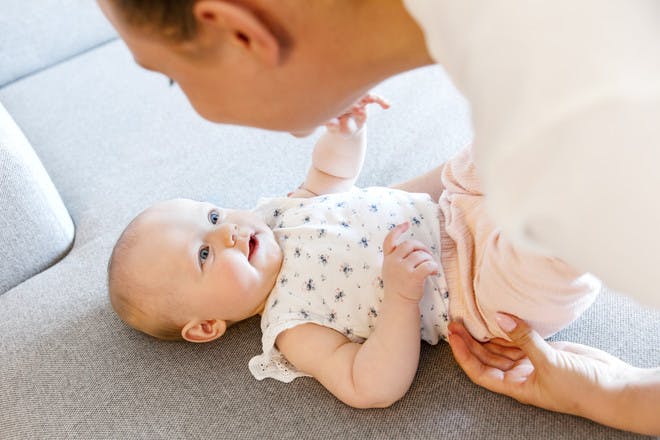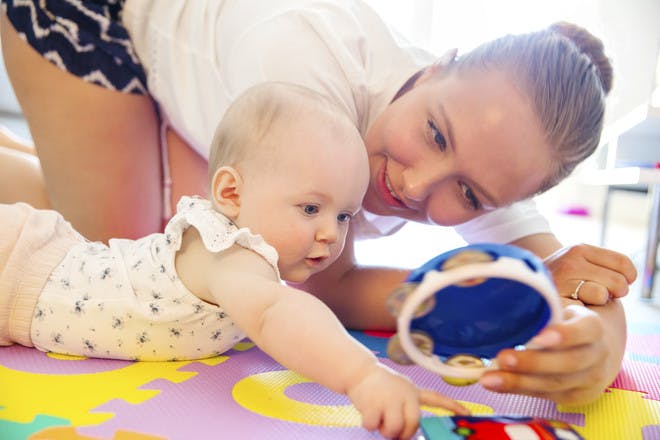19 ways to help your baby develop through play
Promotion

Playtime with your baby is fun. But it’s also an important way of helping her develop, both physically and mentally.
Check out our suggestions of games to play with your baby – from one month until 11 months – to encourage them to reach their developmental milestones.
Not only will they have fun, you'll be teaching them important social, emotional and physical skills.
Do bear in mind that all babies develop at different rates. Occasionally, a significant delay in reaching one or more milestones may signal a problem: if you're really worried, check with your health visitor or GP.
FREE NEWBORN NAPPIES
When she's one month old, your baby will typically:
- Be able to lift her head briefly when placed on her stomach.
- Stare at and focus on your face.
- Be stretching out her limbs and fingers, uncurling her body from the foetal position she's kept in the early weeks.
Games to help with your one-month-old baby’s development
You may notice your baby is starting to track objects with her eyes. You might also be hearing her make happy noises, like cooing and gurgling. Try these games to help her develop these new skills …
Follow the puppet
Your baby’s vision is still a bit fuzzy, so take a toy and hold it about 15cm from her face. Then talk to her, saying, ‘can you see the toy?’ as you move it slowly from side to side.
Singing games
It’s never too early to start talking to your baby. Encourage her gurgles by singing her a lullaby or playing her music from a sound board book.
When they're two months old, your baby will typically:
- Be able to lift their head for a little while, when lying on their stomach.
- Wave their arms and kick their legs.
- Listen with interest to your voice.
- Be able to 'track' with their eyes a colourful object moved about 20cm from their face.
- Make 'happy' noises, such as cooing and gurgling.
Games to help with your two-month-old baby’s development
Keep a close eye on your baby – soon you’re likely to see your first smile, if you haven’t already!
They’re also getting stronger, so encourage this by helping them develop muscles in their neck, back and shoulders with tummy time.
Tummy-time tickles
Place your baby on their tummy for a minute or two at a time. You can build up the time as they get older and stronger. To entertain them, lie next to them on the floor and gently tickle their toes or under their arms.
When she's three months old, your baby will typically:
- Smile back when you smile at them.
- Laugh or squeal with pleasure
- Make 'happy' noises, such as cooing and gurgling.
- Wave their arms and kick their legs.
- Hold their head steady for a few moments when you support them in a sitting position.
Games to help with your three-month-old baby’s development
You baby has discovered their hands! They might be starting to bat at objects in front of them, or stare at their fingers in fascination.
They might also be starting to try and roll over, so never leave them unattended.
Can you reach, baby?
Encourage your little one to roll by placing them on the floor and then lying near them, holding a noisy toy. Talk to them and encourage them to try and reach for the toy – they might surprise you both by rolling over!
Mirror, mirror
Your baby is starting to be fascinated by other babies, and by their own reflection. Stand in front of a mirror holding them, and pull faces. Give them big smiles in the mirror and watch as they smile back.

When they are four months old, your baby will typically:
- Quieten or smile at the sound of your voice when they can’t see you.
- Bat or swipe at objects dangling in front of them, and occasionally hit them.
- Listen intently when you speak to them.
Games to help with your four-month-old baby’s development
Now she’s found her hands, your baby is fascinated by touch. She loves crinkly toys and different textures.
She might also be starting to babble - listen closely and encourage her to talk through singing and chatting back to her.
Guess what we’re doing …
Encourage your baby’s babbling with talking games. Every time you do a daily job - nappy changes, making her lunch, talk her through what you’re doing.
She won’t understand what you’re saying, but she’ll hear the different intonations in your voice.
Row, row, row the boat
From four months, your baby might be able to start sitting up if she’s well supported. To encourage this and help her develop her strength, put her on the floor surrounded by cushions.
Then sit in front of her, hold her hands and gently pull her up to a sitting position. Sing the ‘row, row’ song and then gently lower her onto her back.
When they’re five months old, your baby will typically:
- Be reaching out for objects.
- Explore objects by putting them to their mouths.
- Try to bear weight on their legs when supported.
Games to help with your five-month-old baby’s development
Your baby is getting stronger. They might be able to push up with their arms when they’re on their tummy and have a good look around the room.
They’re also showing off their chatterbox skills with lots of babbling.
Raspberry time
Your baby will have discovered how to blow raspberries, much to their great excitement. Encourage this by having ‘raspberry time’ after baths or when you get them dressed in the morning.
Blow raspberries on their tummy and watch as they copy you by making the noise themselves.
Stacking games
Your baby will be an expert at reaching for objects. Help them with their motor skills by seeing if they can stack toys on top of each other.
Building blocks or stacking rings are a great way to help them learn this new skill.
When they are six months old, your baby will typically:
- Be able to see across a room.
- Have begun to babble.
- Sit up, if well-supported with cushions.
Games to help with your six-month-old baby’s development
Your baby might be nearly sitting up by themselves … and could also be getting into a pre-crawling position or begun bottom shuffling. There are some great games to play to help them with this movement.
Stand up, sit down
Help your baby develop leg muscles by singing the ‘Grand Old Duke Of York’ as you gently help them to their feet. They might want to bounce up and down on their legs in excitement!
After a few moments, lower them back to a sitting position.

When they’re seven months old, your baby will typically:
- Be able to grasp larger objects, and pass them from hand to hand.
- Turn immediately in response to your voice from across the room, or to very quiet noises on either side if they're not too distracted by something else.
- Bear their own weight on their legs for a while, when supported.
Games to help with your seven-month-old baby’s development
Your baby might be sitting up, rolling, crawling and even pulling themselves up holding your hands or holding on to the sofa.
As well as all this physical development, it’s important to help them continue learning about the world around them.
Peek-a-boo
Your baby will LOVE a game of peek-a-boo. Hide your face behind your hands or hide behind a chair and pop out saying ‘peek-a-boo’.
They may be starting to experience separation anxiety, so this is a great game to help them get used to understanding you leave but then you come back.
Demolition derby
Your baby loves repetition and it’s a key way they'll learn about the world around them. Encourage this by helping them build a tower and then let them knock it over.
You might find they want you to do this a LOT!
When they’re eight months old, your baby will typically:
- Recognise familiar people and objects from across a room.
- Stretch out to grasp a small object when offered, and manipulate a toy with great interest.
- Be moving across the room in some way – from rolling and wriggling to crawling and bottom-shuffling.
Games to help with your eight-month-old baby’s development
Your baby is getting better at hand control – they can pick things up and might even have learnt how to throw.
Their vision is now almost as good as an adult’s, so encourage their movement by pointing to different objects - a favourite toy for example - and seeing if they move toward them.
Beep beep
Your baby is increasingly learning about cause and effect. If they push a button, it makes a noise. Toy car keys, books that make noises and remote controls will fascinate them.
When they’re nine months old, your baby will typically:
- Be babbling loudly, combining syllables to make word-like sounds, such as ‘ma-ma'.
- Be able to sit up unsupported.
- Poke at or pick up very small objects, such as crumbs, with their thumb and fingers.
- Be able to hold their own bottle.
Games to help with your nine-month-old baby’s development
This is a busy time for your baby. They might have started cruising around the room, be starting to respond to their name and learning to clap. Phew.
Hide and seek
Your baby will have fun putting objects into containers and pulling them out again. Turn this into a game by putting in a toy and saying, ‘can you find it?’
Big band
This one is noisy! Get out a variety of pots and pans and then let your baby bang them with a wooden spoon. They might also like musical instruments, including tambourines and shakers.

When they’re 10 months old, your baby will typically:
- Respond to their name and understand some words, such as 'no', or simple instructions.
- Be able to bear their own weight when you hold them and bounce them on your knee.
- Cruise around the room, supporting themselves on the furniture.
Games to help with your 10-month-old baby’s development
Your baby is likely to understand simple instructions - even if they don’t agree with what you’re asking them to do!
They might also be developing a pincer movement, using their thumb and fingers to pick things up.
Catch
Sit opposite your baby on the floor and roll a ball to them. Then ask them to roll it back to you. They’re likely to try and throw it - one of their favourite new skills - but repeat the instruction to encourage them to listen.
Shopkeepers
It might feel a bit early for pretend games, but it’s never too early to help your child develop their imagination. Play role play games - pretend to be shopkeepers with pretend fruit or have a teddy bear tea party with some of your little one's soft toys.
When they’re 11 months old, your baby will typically:
- Have mastered the skill of letting go - deliberately releasing an object from their grasp, or handing something to you, if you ask for it.
- Be able to pick up small objects between thumb and finger, and enjoy putting objects in a container.
- Have a good understanding of some simple instructions or questions.
Games to help with your 11-month-old baby's development
Wow, your baby is nearly one! By now they might even have taken their first steps and said a few words with the right meaning attached to them.
Colouring in
Keep helping your baby with their pincer grip by giving them crayons to colour with. Pop a big piece of paper in front of them and help them do their first scribbles on it.
Shape sorting
They’ll be fascinated by separating up objects into different sizes and shapes. Try a shape sorting toy - they'll love working out which object fits where.
Looking for more ways to boost your little one's development? Check these out: